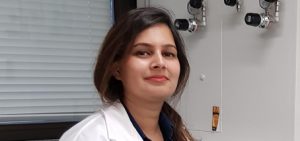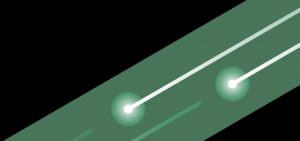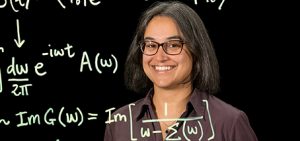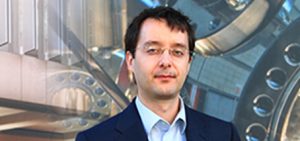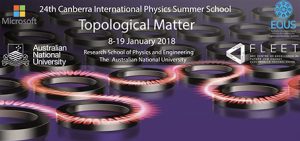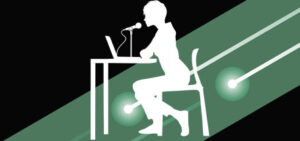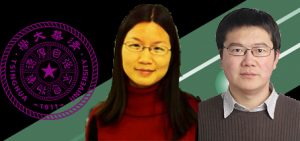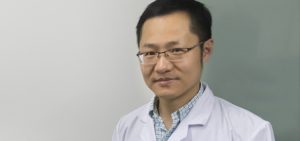FLEET News
New facility improves study of ‘artificial graphene’ at FLEET ‘Like driving a new Maserati!’ The amazing electrical properties of graphene and other 2D, atomically-thin crystals are due to the symmetry of their lattice structure. For example, it is graphene’s famous ‘honeycomb’ lattice that causes electrons to act as they were massless – moving about 70 times faster than in silicon …
Three FLEET researchers have been chosen to represent Australia at the annual Lindau Nobel Laureate Meeting this year. The three FLEET researchers will among ten early-career Australian scientists attending the 69th Meeting of Nobel Laureates in Lindau, Germany, 30 June – 5 July 2019. The 69th Lindau Nobel Laureate Meeting will be dedicated to physics. To date, 42 Nobel Laureates have …
In the Centre’s first two years, FLEET’s recruitment had drawn from the existing physics pool, which (along with related fields such as engineering and material science) unfortunately features a relatively low percentage of women. Women in FLEET Fellowships were conceived as a way to allow the Centre to begin to increase the percentage of women above the average in these …
FLEET’s Meera Parish has been named 2019 Outstanding Referee, the only one in Australia, by the influential American Physical Society (APS). The APS selected 143 Outstanding Referees for 2019, each of whom have demonstrated exceptional work in the assessment of manuscripts submitted to the Physical Review journals. The Outstanding Referee program recognises approximately 150 currently active referees each year, and …
Researchers have used liquid metals to turn carbon dioxide back into solid coal, in a world-first breakthrough that could transform our approach to carbon capture and storage. The research team led by RMIT University in Melbourne, Australia, have developed a new technique that can efficiently convert CO2 from a gas into solid particles of carbon. Published in the journal Nature …
• Ferroic and multiferroic topological structures offer exciting potential in future nanoelectronics • Commentary piece published this week in Nature Materials The connection from fridge magnets to cutting edge materials science is shorter than what one might expect. The reason why a magnet sticks to your fridge is that electronic spins or magnetic moments in the magnetic material spontaneously align …
Recognising the increasing importance of topological physics, FLEET helped run the 2018 Canberra International Physics Summer School on Topological Matter at ANU – a great opportunity for early-career Australian physicists to hear from leading experts from around the world. Over 90 attendees discovered topological materials’ applications to photonics, ultra-cold systems and quantum computation. Nobel laureate Prof Duncan Haldane (Princeton University) …
In 2018, FLEET began an ongoing partnership with the ARC Centre for Engineered Quantum Systems (EQUS) to run a yearly ECR workshop building skills in communication, methods for pitching and presenting science, and working collaboratively with others. In between the teams’ pitch preparation and delivery, formal training sessions included science communication, oral presentations and how to craft an engaging research …
FLEET’s fruitful relationship with Tsinghua University (Beijing) has been expanded, with the Centre welcoming two new Partner Investigators to lead research collaborations. Prof Shuyun Zhou studies the electronic structure of novel two-dimensional materials and heterostructures using advanced electron spectroscopic tools, including angle-resolved photoemission spectroscopy (ARPES), spin-resolved ARPES, nano-ARPES and ultrafast, time-resolved ARPES. She has made important progress on the electronic structure …
Monash University engineers have unlocked the door to earlier detection of cancer with a world-first study identifying a potential new testing method that could save millions of lives. Researchers found that a sensor using new, more sensitive materials to look for key markers of disease in the body increased detection by up to 10,000 times. Associate Professor Qiaoliang Bao from …
Communications workshop for early-career researchers and PhD students Success in science requires the ability to describe one’s research in a coherent and compelling manner. FLEET has made an early start in building these skills in ECRs, with a half-day training session targeting science communications skills. A professional external facilitator from consultancy Mind Your Way coached young researchers on the particular …
In 2018 FLEET began a series of live-streamed seminars to help share research results across the Centre, keep members informed on latest FLEET research, and enhance inter-node collaboration. Early-career researchers presenting the seminars gain valuable presentation experience, and benefit from feedback on their research from diverse Centre members. These seminars also provide an opportunity for regular get-togethers in each node, …
Education Minister Simon Birmingham and ARC CEO Sue Thomas visited FLEET labs in may this year at the University of Wollongong’s (UOW’s) Innovation Campus. UOW node leader Prof Xiaolin Wang, Centre Deputy Director Prof Alex Hamilton (UNSW) and UOW researchers gave the Minister a quick introduction to ICT energy-use issues, topological insulators and atomically-thin materials, including a tour of labs …
Forging a Centre that is greater than the sum of its parts FLEET’s inaugural annual workshop in Torquay, Victoria, represented the Centre’s first chance to cement relationships between geographically-isolated research nodes and diverse physics disciplines. With a focus on education, each day began with a tutorial laying out the fundamentals for one of three research themes. This introduction maximised the …
FLEET hosted the International Conference on Two-Dimensional Materials and Technologies (ICON-2DMat) in Melbourne in December 2018. This was the first time ICON-2DMat had been held in Australia, and with around 300 international and Australian delegates attending, it was an opportunity to showcase the strength of atomically-thin materials research in Australia. Attendance at the international conferences on 2D materials is growing, …


